The landscape of Hollywood is ever-changing, with huge developments over the last couple of years. With many writing roles going remote and the opportunities of working from anywhere in the world, just what does the future look like for the screenwriter, both emerging and professional?
The traditional Hollywood path vs. the new era of remote writing
The traditional Hollywood path has long been depicted through in-person meetings, pitching sessions, and networking events in the heart of the film and television industries. The benefits of this approach have always been based in face-to-face communication and direct access to industry professionals.
However, this path has always meant high competition and exclusivity to those who live or have access to the industry hubs in areas such as LA and New York. Aspiring writers often face the challenge of geographical limitations and feel the pressure to relocate to be ‘in the thick of it’.
On the flip side, the new era of remote writing has taken advantage of technology to bridge these geographical gaps. With the use of evolving software and programs, writers can now collaborate not just with each other, but with producers, directors, and other crew members from across the world with the click of a button or tap of a keyboard.
Such a phenomenon has opened doors for diverse stories and voices, hence breaking down the barriers that have been gatekeeping Hollywood for so long. Of course, remote communication has its own limitations, with the lack of face-to-face interaction and personal connections that can be essential for the advancing career of the screenwriter.
Of course, it all comes down to a writer’s preference. Some may thrive in traditional Hollywood, while others will flourish in the flexibility and accessibility of writing remotely. However, with the continual advancement of technology and accompanying software offerings, the remote writer seems to be the way of the future. We will, of course, need to watch this space.
Nevertheless, whichever method a writer chooses, collaboration will always be at the heart of the screenwriter’s work. Let’s take a look at why:
Why Collaboration is Key
Idea Generation
While one writer can devise an idea, a group of writers can bounce thoughts off each other in a brainstorm, leading to even more fresh and innovative ideas.
Writers can also build on preexisting concepts and use these to develop more complex narratives, and structures. This is also true for character development, ensuring multi-dimensional, relatable characters whose dialogue is authentic and resonant with the story they are telling and the emotions/motives that drive the plot.
A Range of Perspectives
No writer is the same, and neither is a story. Small details, quirks, and imaginations are what pull a truly authentic script together. It could begin with the screenwriter’s initial vision, followed by insights and ideas from a director, producer, or even another writer. That screenwriter will also seek feedback in the initial developments of the script, receiving critique from a script editor or coverage from a reader.
Some writers will be wizzes at structure and character, others on plot and dialogue. Inciting as much diversity into a project as possible will allow for various viewpoints, experience, and expertise, enriching the story’s engagement and authenticity.
Feedback and Improvement
By constantly collaborating, writers provide ongoing feedback and constructive criticism to refine a script. Inconsistencies and potential weaknesses will be naturally easier to identify, the more eyes there are on a screenplay. Conflicts and disagreements can also be ironed out a lot quicker.
Adaptability is also a key skill for any screenwriter; they must be open to adjusting their work to align with the vision of the room, or the director’s vision. Feedback and changes to budgets and filming restraints can also force writers to make quick amendments to their scripts.
This overall process of feedback and resolution should then foster a productive working environment of compromise and negotiation. The result should be a polished and cohesive script.

Networking
As we previously discussed, networking is a key part of a screenwriter’s career development. Collaboration can lead to valuable industry connections and opportunities. If a writer is successful in these collaborations, it can bring about ongoing working relationships or even referrals for other projects.
Shared Vision
Sometimes there is nothing more exciting than a shared vision; a group of writers and creatives excitedly discussing their plans for a story and how they’re going to bring it to life. A combined commitment of resources and ideas that everyone can appreciate and enjoy on the team.
The Writer’s Room
Of course, it’s all well and good talking about the benefits of collaboration in screenwriting, but let’s now take a look at collaboration in action: The Writer’s Room.
A writer’s room is a cooperative workspace where a group of writers, often led by a showrunner, come together to develop, and write, normally for a TV show with episodic storytelling at its core.
It’s not just the writers themselves who contribute to the overall vision of a show. You’ll also find producers alongside the showrunner at the head of the operation, with story editors taking a leadership position for the writing team and usually writing the final draft of the script.
The staff writers are the main idea generators in the room but won’t write the final episode. They don’t always receive the credit they perhaps deserve for the work they do, but they’ll be working towards a story editor position.
Writers’ assistants take notes and proofread scripts. They don’t generate the ideas but are invaluable in ensuring the writers’ room runs smoothly.
Writers’ rooms have seen more of the spotlight in recent years due to the increasing amount of work being completed remotely. Over the course of the COVID pandemic, Zoom Rooms became a hive of activity for writers, and continue to do so in the post-pandemic world, as with many industries.

This transference to remote working has provided a wealth of benefits to many writers. It’s made the possibility of ‘making it’ more accessible to those who don’t live in and around Hollywood, to those who are disabled, and has allowed writers to be more flexible.
Remote working has given the industry further scope for diverse voices and has saved money on running costs on physical studio spaces.
Of course, there have been teething problems with such a huge shift. Those writers well established in the industry haven’t been used to remote working, or virtual writers’ rooms on platforms like Zoom. Zoom also doesn’t allow for face-to-face communication, meaning it can be tricker to connect as effectively.
Success Stories
Some of the world’s best loved TV shows were born and bred in a writers’ room. Let’s find out what made them tick and why they were successful!
The Good Place, NBC
Executive Producer Michael Schur is a firm believer in comedy writing as a collaborative process. In his writers room for The Good Place, Schur had 11 full-time writers with various backgrounds in comedy writing, playwriting, and blogging, alongside consultants assisting with the philosophy of the show.
Before they began planning the intricate story and character arcs for the upcoming season, Schur’s team looked at the big picture and where they wanted to end. If they suffered any form of writer’s block, the team would get outside for a walk or watch silly internet videos online to clear their heads and spark some new inspiration.
From this, we can deduce a happy and friendly writers room with ‘room to grow’ and freely bounce ideas around. Aside from this, the team had a clear ‘big picture’ vision which they all bought into before setting off on their individual episodes.
The Marvelous Mrs. Maisel, Amazon
Like The Good Place, the team behind this Amazon hit relied upon a team of stand-up comedians to help bring Mrs. Maisel’s stand-up world to life. Where it is not like The Good Place is in its small team of executive producers Amy Sherman-Palladino and Dan Palladino and two staff writers.
Both Amy and Dan direct and write episodes, so there is little time for discussion and more time for action. The team is very much in-sync with the direction of the series and its characters making it widely successful.
Celtx’s Writers Room
Bringing the virtual writers room to your class or writing group is a fantastic way to gain experience not just in a writers room environment, but to hone their writing and collaboration skills.
So, how can Celtx help you do this?
Celtx’s Tools for Remote Collaboration
Whether you’re organizing a learning plan for your students or working in a writing team, Celtx has a wealth of features available aside from the standard writing and formatting benefits. Check them out below:
Collaboration Features
Whether you’re a student or part of a writing team, Celtx’s collaborative features allow you to work together from the other side of the world. All you need is Celtx, an internet connection and a device of your choice.
Sharing
To share a project with those you wish to collaborate with, simply click on the Projects tab on the left-hand side of the screen.
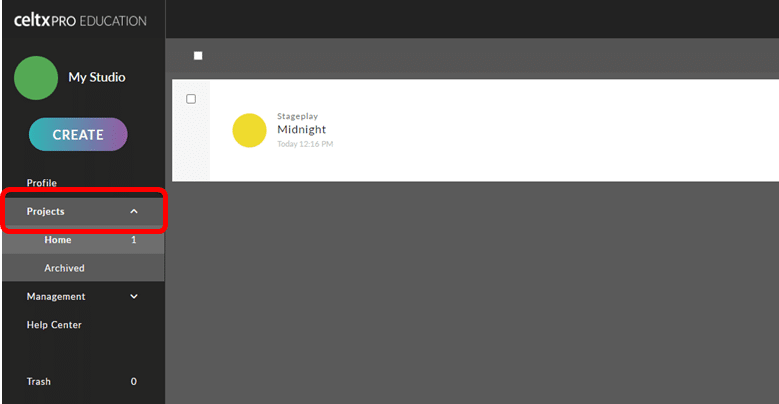
Next, scroll to the right-hand side of the screen and click the purple Share button next to the relevant project.

A window will then pop up with the option to add the email addresses of those you want to share with. Alternatively, if they are already a member of your Celtx Studio (education or pro), you can simply type in their name or the name of the group.
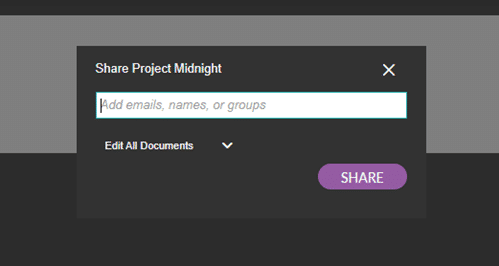
In the dropdown menu under the white box, you can select whether the recipients can edit all documents, read all documents, or read the script only, depending on your script’s needs.
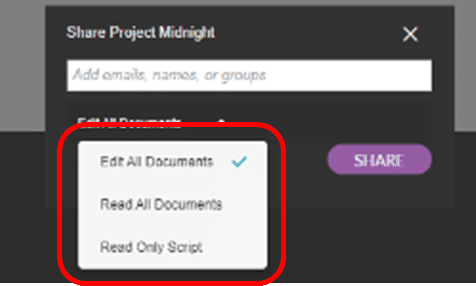
You should now see who has been successfully added to your script in the Team column next to your chosen project.
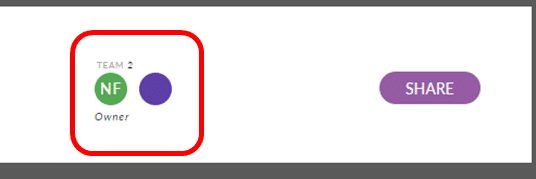
For more information on sharing your project, click here.
Co-Writing
Once you’ve shared your work with your fellow writers, it’s time to write. Our Premium Script Editor allows you to write together seamlessly with real-time updates no matter where you are in the world.
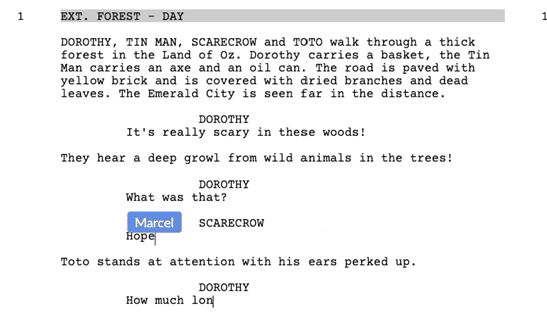
If you’ve taken a step away from your script whilst your fellow writers have continued typing, you can access the edit history by clicking File in the top ribbon.
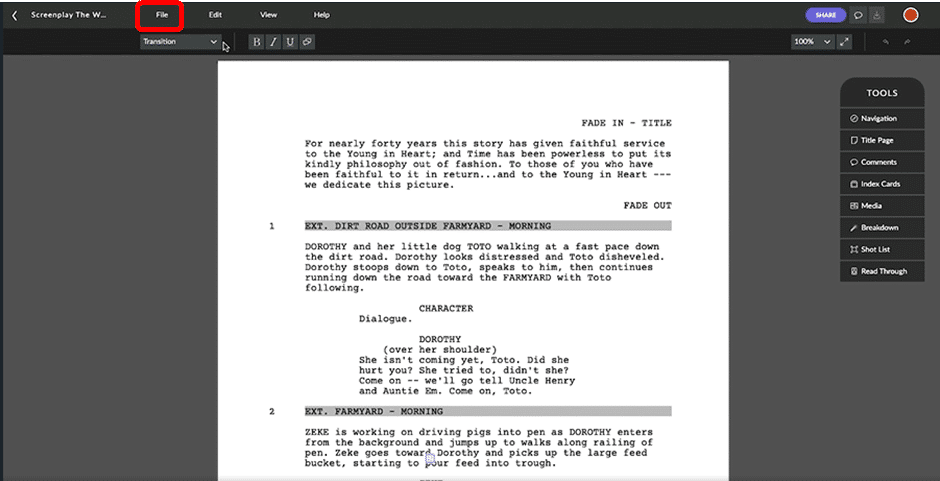
From the drop-down menu, click History.
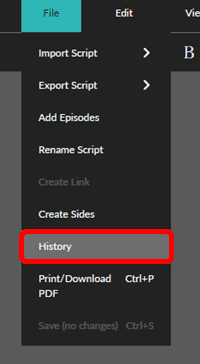
Choose the date you want from the menu, and a list of all the historical versions of the script will appear and who made the edits.
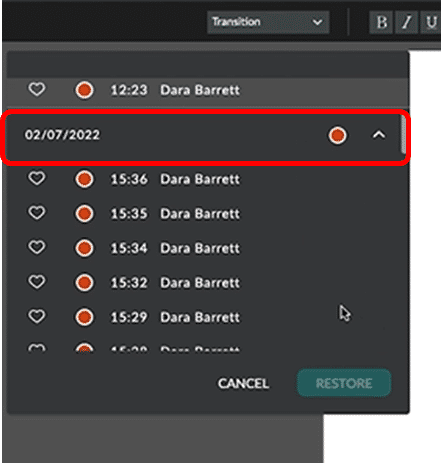
This is a great way to keep track of any changes made and to follow up with your writing partners.
Comments and Mentions
With Celtx’s streamlined interface, it’s simple for writers and their collaborators to comment on pre-existing work.
To add a comment to a script, start by clicking the speech bubble in the top right-hand corner of your screen or the Comments tab in the Tools menu.
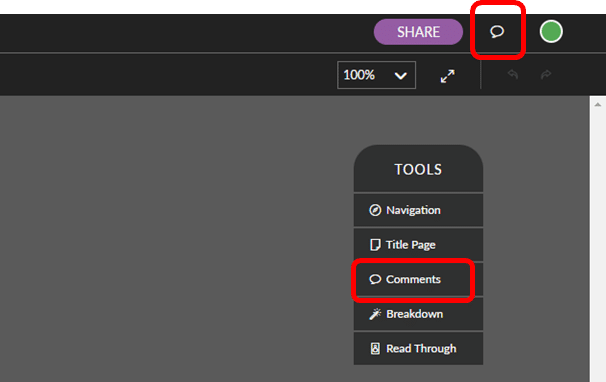
Next, highlight the specific section you wish to comment on.

Click the + sign in the comment panel to add your comment.
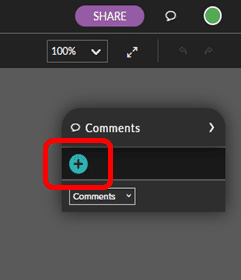
Then type away!
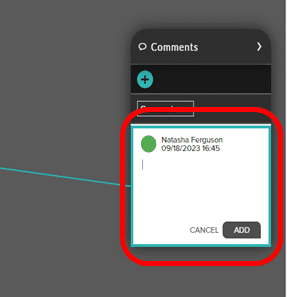
To organize your comments, you can color code them depending on the commenter, the reason for the comment or anything else that works for you.
To assign a color to a specific comment, click on its corresponding hamburger menu.
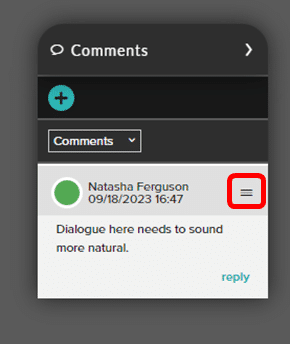
Then select the color of your choice.
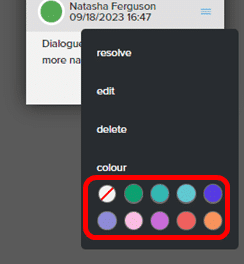
You may also notice the options to Resolve, Edit, or Delete your comment within this menu.
If you require your comment to refer to a specific writer within your group, you can Mention them. To do this, simply type the @ symbol at the start of your comment. A drop-down menu will then appear with the names of all the collaborators on your project to select from.
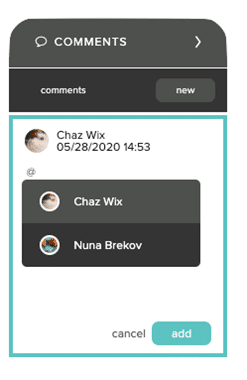
The writer in question will then receive an email notifying them they have been mentioned in a comment, making it easy for them to read and respond accordingly.
Conclusion
No matter what stage you are at in your writing career, whether you’re a student, budding writer, emerging talent, or a professional screenwriter, Celtx’s features are perfect in ensuring your project gets the attention is deserves from your entire writing team.
With a streamlined interface and user-friendly collaboration and feedback features, Celtx is the best choice for your school or writing team. You don’t have to be in Hollywood to access first-class screenwriting tools and feel empowered in your work.
To find out more about what Celtx has to offer, visit our website.
